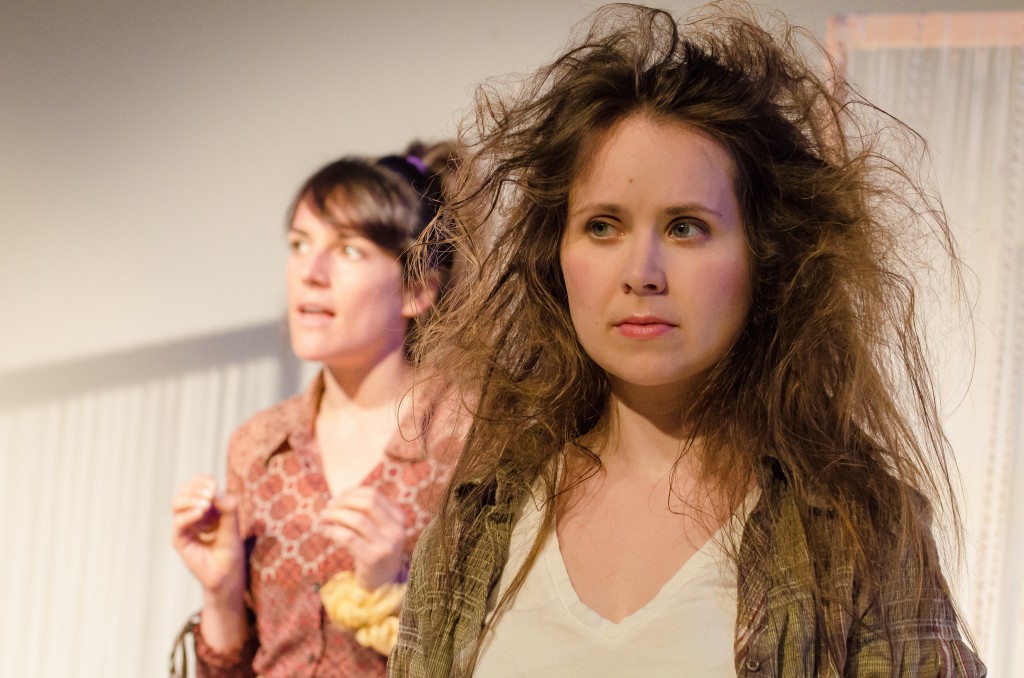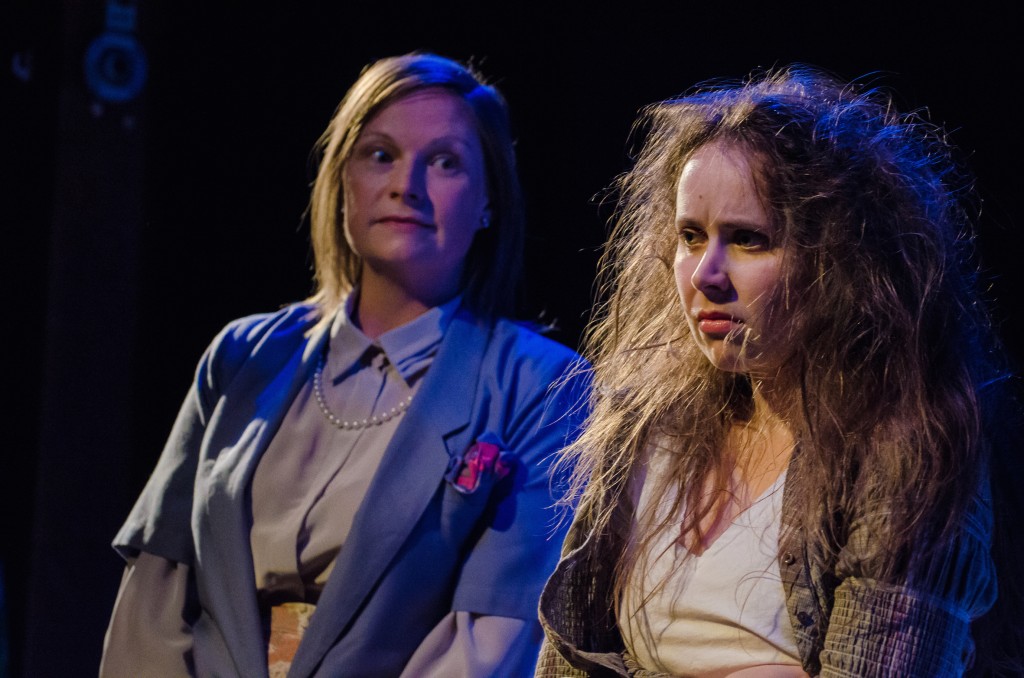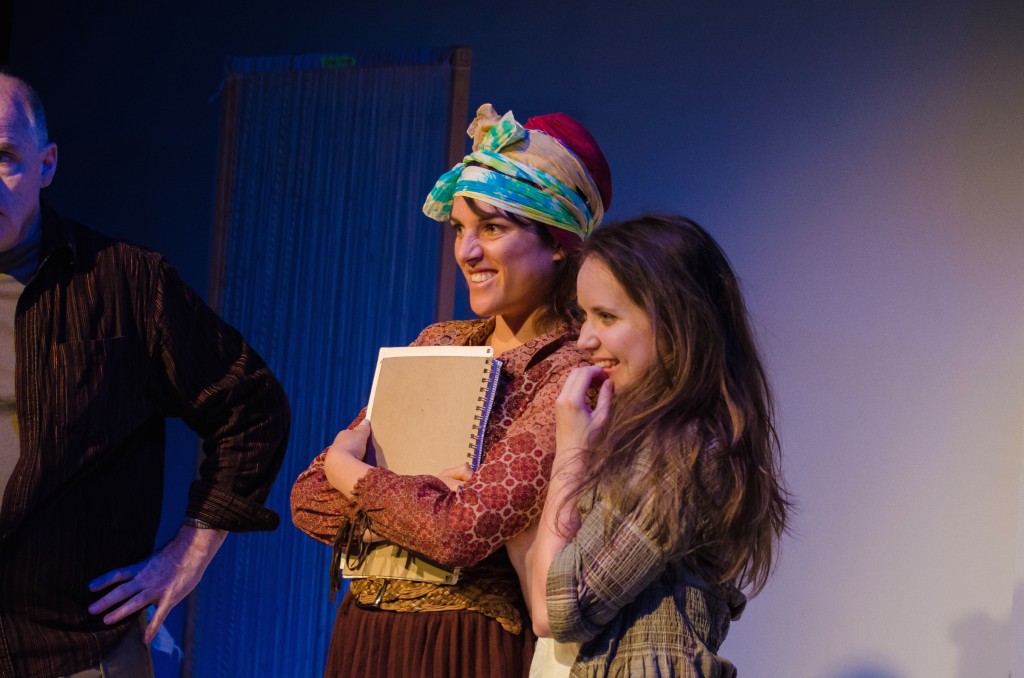
Credit: Ryan Alexander McDonald
At Havana Theatre until June 13, 2015
www.brownpapertickets.com
Posted June 5, 2015
Notwithstanding a nomination for the Dora Mavor Moore Award for Outstanding New Play in 2009, this script by Charlotte Corbeil-Coleman is a dog’s breakfast. It’s a mixture of low comedy and real pathos. Low comedy: young Anna (Caitlin McCarthy) surfacing after fellating “Poet” (Markian Tarasiuk) with faux ejaculate all over her face. Real pathos: a deathbed scene between McCarthy and Eileen Barrett (as “Mother”).
Genevieve Fleming (Hardline Productions’ Artistic Producer) directs for Theatre Plexus and brings together a hardworking cast including David Bloom (“Father”), Tamara McCarthy (“Aunt”) and Stephanie Izsak (Madelyn).
Performance trumps script. Caitlin McCarthy, as teenaged Anna (13? 15?), so believably has head lice and scratches so ceaselessly, sometimes frantically, that I had to quell the urge to start scratching. But why, after months of scratching, Anna’s mother doesn’t get over her own flower-child anxiety about “chemicals” and just give Anna the go-ahead to use the shampoo, I don’t know. Or why doesn’t Anna just do it herself? The playwright suggests that Anna uses suffering and lust – she’s desperate to have sex – as a way of dealing with her mother’s terminal illness. I didn’t buy it. It is, however, Corbeil-Coleman’s true story, written shortly after her own mother died of cancer when Corbeil-Coleman was a teenager, so I guess it happens and it’s candid of the playwright to reveal it.

Credit: Ryan Alexander McDonald
Barrett is the sweet, long-suffering mother and she’s good at it but we never really get to know this character. Bloom, the go-to guy for a nice-guy role, gets a small opportunity to vent his grief but the role is so underwritten. Tamara McCarthy, as the aunt could be pulled way back: she doesn’t need to be a cartoon. And as the girlfriend of the poet – who appears to be just out of his teens – she’s not credible. The poet is another unbelievable character: a young man of indeterminate age who writes very, very bad poetry and cooks vegetables for the mother as she’s dying. Tarasiuk does his best but where do you take a character like this? And then, of course, he has to groan and moan and say, “Oh god, Oh, god” as Anna fellates him.
Oh, god.
Buried in all of this is a really interesting play. But it’s not the one Corbeil-Coleman wrote. The play begins with each of the characters saying, one after the other, “If this were my story . . . “ The real story at the heart of Scratch, it seems to me, is Madelyn’s story and Stephanie Izsak nails it. Madelyn, a budding artist, is the child of uncaring parents and she adores Anna’s mother, a painter. Madelyn is devastated when the mother is diagnosed but somehow she’s not allowed to see her because she’s not family. Izsak makes this young girl’s grief truly heartfelt and it feels as if this should be the story.

Credit: Ryan Alexander McCarthy
Florence Barrett’s design works well: three woven screens are easily manipulated to provide a changing room at Gap where Anna doesn’t buy jeans, a hospital room where the mother lies dying and various other settings. Jeff Elrick’s lighting zeroes in tightly and brightly on characters as they deliver monologues – some of which don’t seem to have much to do with moving the plot along.
Opening night audience seemed to like it and laughed a lot. As someone who has some experience with this situation (both head lice and cancer) – but used the shampoo to get rid of the lice and, miraculously, survived cancer – Scratch seems highly improbable and just plain awkward. The tagline – “It’s a matter of lice and death” – might have tipped me off to the strange juxtaposition of comedy and pathos.

